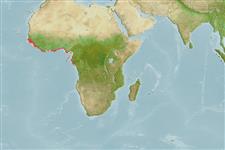Environment: milieu / climate zone / depth range / distribution range
Ecology
Marine; brackish; reef-associated; depth range 18 - 50 m (Ref. 3585). Tropical; 14°N - 5°S
Eastern Atlantic: Senegal to Congo (Ref. 3585, 57225), including the Cape Verde (Ref. 3585).
Size / Weight / Age
Maturity: Lm ? range ? - ? cm
Max length : 10.2 cm SL male/unsexed; (Ref. 3585)
Dorsal spines (total): 3; Dorsal soft rays (total): 11 - 14; Anal spines: 0; Anal soft rays: 6 - 10. Diagnosis: body short and globose; mouth large with many small, villiform teeth; skin rough, covered with bifurcate dermal spinules; pectoral-fin lobes attached to sides of body; illicium nearly twice as long as second dorsal-fin spine (Ref. 57225).
Inhabits coastal waters (Ref. 26999). Occurs in marine or brackish water (Ref. 97225). Feeds on fish and shrimps (Ref. 28587).
Life cycle and mating behavior
Maturity | Reproduction | Spawning | Eggs | Fecundity | Larvae
Oviparous.
Pietsch, T.W., 1981. Family Antennariidae. In W. Fischer, G. Bianchi and W.B. Scott (eds.) FAO species identification sheets for fishery purposes. Eastern Central Atlantic; fishing areas 34, 47 (in part). Department of Fisheries and Oceans Canada and FAO. vols. 1-7. pag. var. (Ref. 2720)
IUCN Red List Status (Ref. 130435: Version 2024-2)
Threat to humans
Harmless
Human uses
Tools
Special reports
Download XML
Internet sources
Estimates based on models
Preferred temperature (Ref.
123201): 21.9 - 26.4, mean 24.4 °C (based on 19 cells).
Phylogenetic diversity index (Ref.
82804): PD
50 = 0.5005 [Uniqueness, from 0.5 = low to 2.0 = high].
Bayesian length-weight: a=0.02630 (0.01029 - 0.06725), b=2.96 (2.73 - 3.19), in cm total length, based on LWR estimates for this (Sub)family-body shape (Ref.
93245).
Trophic level (Ref.
69278): 4.0 ±0.68 se; based on food items.
Resilience (Ref.
120179): High, minimum population doubling time less than 15 months (Fec assumed to be > 10,000).
Fishing Vulnerability (Ref.
59153): Low vulnerability (10 of 100).
